Nature based solutions & smart governance in water management
The transnational conference of the CWC project was held on 24 March 2021. The main goal of the conference was to summarize and share the mid-term lessons learnt of City Water Circles project spotlight the already published results and give advance the expected outcomes of the next periods.
Beyond presenting the main outcomes, project partners and joint experts were invited to a discussion to cover a wider spectrum of water issues and climate change in Central Europe.
Highlights of the live discussions
Central European municipalities identify the high investment cost as the main barrier of spreading the innovative circular urban water management tools. Mr. Erwin Nolde, expert in CWC project researcher and technical expert (fbr.de) clarified how can cities overcome this barrier.
He explained that the traditional economic calculations for innovative water concepts often take into account only the investment costs and the savings in drinking water and wastewater costs. This is methodologically wrong and not future-oriented. It is imperative that the external costs of conventional solutions (impacts of floods and droughts, environmental and health damage) as well as the real improvements resulting from wastewater avoidance, reduction and recycling and blue-green infrastructures should be taken into account.
For new buildings, he demands - in view of the fulfilment of the Sustainable Development Goals - to which all member states have committed themselves, that innovative water concepts be included as mandatory minimum standards in building codes. Otherwise, the chances of averting the climate catastrophe would be permanently lost.
However, the implementation requires that corresponding laws and technical regulations are developed at the national level in order to provide legal certainty for all parties involved.
The benefits of non-conventional water sources like rain and grey water were in the focus of the explanation of Mr. Anacleto Rizzo (http://www.iridra.eu/it/). The waste of our valuable resources was declared by the example of potable water used in the households: we invest huge effort and infrastructure to produce and transfer drinking water just to flush it down the toilet.
Beyond the multipurpose benefits of nature based solutions, such as microclimate enhancement, amenity, educational value, biodiversity support, which are the key aspect differentiating green from grey solutions, he underlined the lower infrastructural needs of decentralized water management systems. Less kilometres of pipeline need less investments and maintenance costs. If we apply nature based solutions in urban planning we can combine green and conventional “grey” elements to optimize the benefits of different systems.
He mentioned the importance of the first experiences with new technologies: successful pilot projects are icebreakers in the local communities, but failed projects risk the trust in nature based solutions.
Ms. Emanuela Saporito (http://www.ortialti.com/en/) presented Progireg project, a good example of innovative revitalization with nature based solutions of post-industrial areas in Turin. In the project the underused areas are utilized with urban gardens in approach of direct participation of local communities.
The former industrial spaces are transformed to urban gardens with extensive and intensive green roofs, habitat for pollinators, box-gardens for the local citizens and community spaces. The rainwater harvesting for irrigation and water retention to reduce the flowing peaks are also important elements of the design.
Local citizens are involved not only in the designing process but – with the long-term support of the municipality - they take responsibility for the maintenance and management of the area in the future.
Watch the eyecandy of PROGIREG
Reflecting on the question of definition and importance of ‘Smart Water Government’, researcher of Poliedra, Ms. Simona Muratori explained it as a new approach, the good use of available technologies with active and widely involvement of stakeholders. Technological tools have lot of advantages in water management: e.g with smart metering the monitoring can be improved, but in the same time, it can raise awareness, help communication and involvement of citizens.
Government is not effective in the water sector, because of its complexity: inter- and intra-sectoral dependencies, multi-stakeholders, multi-scale, wide diversity of problems and multiplicity of responsibilities at different levels. The problems of climate change can be solved with interaction and active cooperation between different sectors professions and multi-level groups of stakeholders. Each actor needs to provide their specific knowledge and do their task at best, therefore have access to the necessary knowledge base and tools. The cooperative approach ensures the future engagement for the outcomes and stakeholder’s contribution to the implementation.
Mr. Konstatntin Ivanov (Global Water Partnership Central Europe) draw the attention on the position paper of the organization: ‘Green Recovery in Central and Eastern Europe from a Water Perspective’
The document provides recommendations for recovery from the COVID-19 pandemic from integrated water resources management perspective. The paper proposes a set of water related measures in aspect of the use of EU financial sources to improve the resiliency of water management sector in Central Europe. The position paper reflects also on the gaps in equality of access of clean and healthy water, waste water treatment, and sanitation in the territory.
Ms. Orsolya Barsi, (Head of Climate Strategy Unit at Climate Department of Budapest City) listed the biggest challenges caused by the climate change in Budapest city. Beyond the extremities in precipitation like flash floods, the heat waves during summer, and the experienced and expected increase of tropical nights, further problems like decreasing green areas of private real estate, soil erosion, increasing paved surfaces are threating the safe and balanced water management.
Municipality of Budapest utilizes different policy tools to boost circular urban water management: the recently developed strategic documents of the city are based on an innovative approach of land use, rainwater harvesting, water retention, management of blue and green infrastructure and natural areas. The Sustainable Energy and Climate Action Plan, Climate Strategy, Green Infrastructure Action Plan, and pilot projects serve the resilient water management of the city.
The expert highlighted the importance of communication and cooperation between different areas of expertise. She explained, to tackle the listed challenges, the interdisciplinary approach is the key.
List of presentations and videos
Stakeholder Involvement & Capacity Building in Circular Urban Water Management, Ms. Simona Muratori Poliedra polimi.it
The presentation guides the audience in the aim methodology and techniques of successful stakeholder engagement and Digital Learning Resources on circular urban water management.
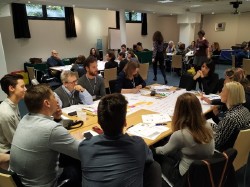
Developing and testing innovative solutions for circular urban water use, Ms. Norma Khoury-Nolde fbr.de

One of the main expected outcomes of the project is an online thematic tool catalogue on circular urban water use. The experiences of the 5 pilot investments of 5 cities support the tool collection with useful practical information. Catalogue is coming soon, keep updated!
From Local Needs to European Circular Urban Water Strategy, Ms. Anja Prislan ezavod.si

Why and how the project partners are working on development of water management strategies for Central European cities? The step-by-step process of innovative and cooperative strategy building can be learned in the presentation.
Pilot action in Turin, Ms. Alessandra Aires and the young contributors
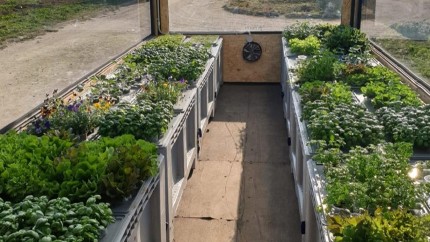
The building of Hostel OPEN O11 is under transformation. The solid concrete roof will turn to green oasis, rainwater will be harvested and used for irrigation and the rooftop garden will be open for meetings social interactions and have a rest. Watch the video.
Pilot action in Budapest, Zugló, Mr. Gábor Zimborás
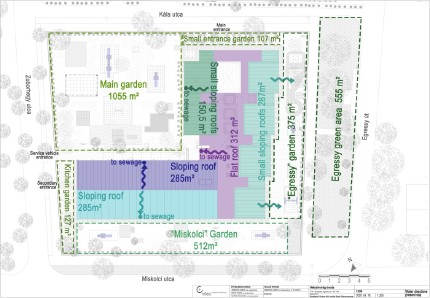
The goals of the investment in Hétszínvirág kindergarten are improving the ecology on the micro level with an enhanced waterbalance and some greywater re-use and creating a better outdoor play environment with more natural affordances.
Pilot action in Maribor, Mr. Matej Levstek
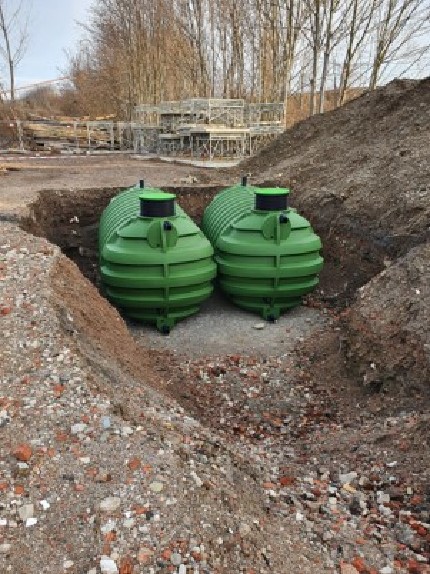
The innovative technology tested in Maribor utilizes harvested rainwater and treated wastewater for production of secondary raw materials, which will be used in road reconstruction and revitalized areas. The solution reduces the water consumption of the material production, saves natural resources, and demonstrates the circular economy in practice.
Pilot action in Bydgoszcz, Ms. Hanna Levandowska

The new raingardens of Bydgoszcz demonstrate alternative ways of water management and hopefully help to change the minds of citizens designers and decision makers. The raingardens will be located at museum, a city office building, and a youth cultural centre.
Pilot action in Split, Mr. Petar Solic
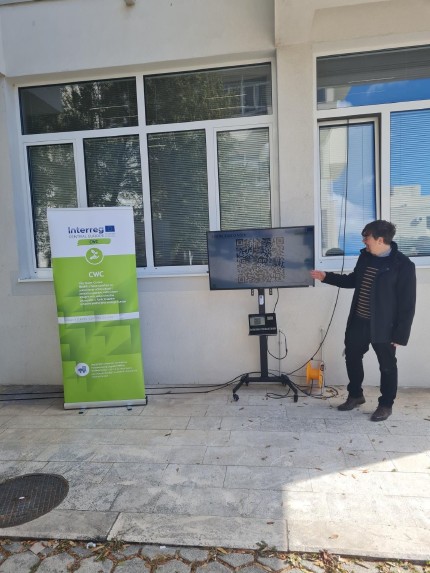
Smart metering system with real-time monitoring was installed in the building of Split University. The smart radio control system helps to rationalize the water consumption and raise the awareness of building users, as consumption data are instantly visible on a public screen right at the entrance. No more leaky drops!
Need more info about CWC? SUBSCRIBE HERE for the next newsletters vsit our website and follow us on Facebook Instagram and Twitter!
